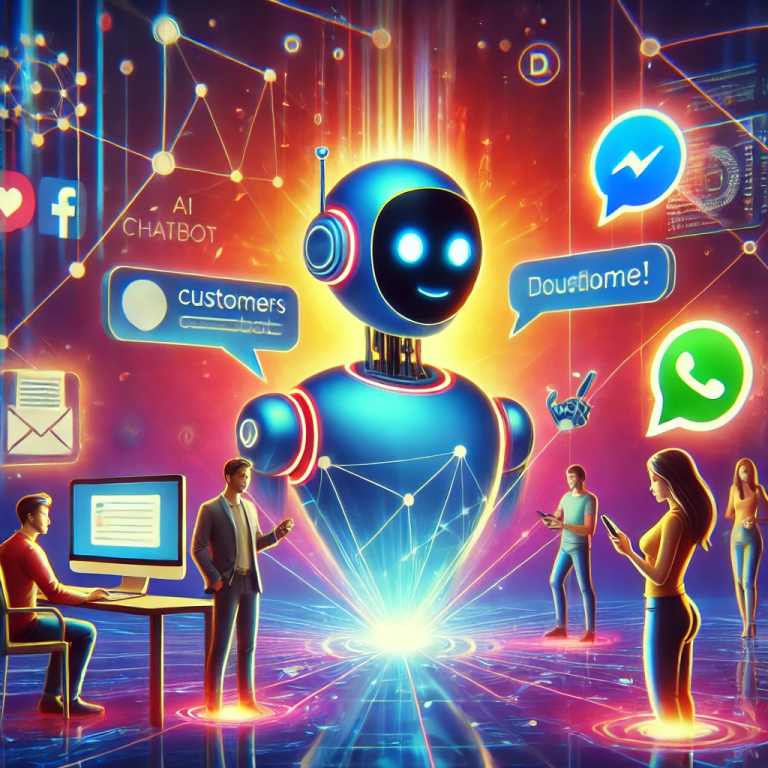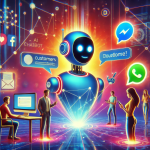ChatActor.com - AI Chatbot for customer service
The Rise of AI Chatbots in Customer Support
Revolutionizing Service: Chatbots Explained
Imagine this: It’s late at night, and you’re scrolling through your favorite online store. You have a question about a product, but the thought of waiting hours for an email reply or being put on hold the next day makes you reconsider the purchase. Then, with a few clicks, a chatbot pops up, greeting you by name and answering your query instantly. Problem solved, purchase made, and you’re left impressed.
This seamless interaction highlights the magic of AI chatbots in customer support—a tool that’s transforming how businesses connect with their customers. But how exactly did we get here, and why are chatbots becoming indispensable? Let’s dive in.
Chat Actor – AI Chat Bot for your customer service. Sign Up Now
The Evolution of Customer Support
Customer service has come a long way. Decades ago, it was limited to physical stores, face-to-face interactions, and later, telephone support. These methods, while effective in their time, were resource-intensive and slow to scale.
Fast forward to the digital age, and email and live chat entered the scene, offering faster options. However, even these struggled to keep pace with rising customer demands, leaving businesses scrambling to find a better way. Enter AI chatbots—a revolutionary solution that combines speed, scalability, and personalization.
Take, for instance, a small e-commerce store that transitioned from manual email support to a chatbot. Within months, they saw a 40% reduction in response times and a 25% increase in customer satisfaction. The reason? Chatbots meet customers where they are—on websites, social media platforms, or messaging apps like Facebook Messenger.
How AI Chatbots Work
At their core, AI chatbots operate like a well-trained team member who never takes a break. Powered by Natural Language Processing (NLP) and machine learning, they can understand and respond to human queries with surprising accuracy.
Think of NLP as the chatbot’s ears and brain, enabling it to “listen” to what a customer types and make sense of the context. Meanwhile, machine learning helps chatbots continuously improve, learning from past interactions to provide better answers over time.
To visualize this, imagine a customer asking, “Do you have size M in stock?” A basic rule-based chatbot might only recognize “stock” and give a generic reply. An AI chatbot, however, uses NLP to understand the full context and respond with, “Yes, size M is available. Would you like me to add it to your cart?”
This level of sophistication makes AI chatbots incredibly versatile. Whether they’re processing returns, guiding users through troubleshooting, or upselling products, their potential is nearly limitless.
Key Benefits of AI Chatbots in Customer Support
So why are businesses flocking to AI chatbots? Let’s break down the benefits:
- 24/7 Availability
Unlike human agents, chatbots don’t clock out. They’re available around the clock, ensuring customers receive support whenever they need it. - Scalability Without Extra Costs
Imagine running a sale and getting thousands of customer inquiries. Hiring additional staff would be expensive, but a chatbot can handle the surge effortlessly, replying to multiple queries simultaneously. - Enhanced Personalization
Modern chatbots aren’t just transactional; they’re conversational. By leveraging data, they can greet customers by name, recommend products based on browsing history, and even remember past interactions. - Improved Customer Satisfaction
Speed and accuracy are critical to customer satisfaction. Chatbots excel at both, resolving issues quickly and leaving customers impressed with their efficiency. - Cost-Effectiveness
While there’s an initial investment in implementing AI chatbots, the long-term savings are undeniable. Businesses save on staffing costs while improving operational efficiency.
Take the example of a clothing brand that implemented a chatbot for order tracking. Not only did it reduce call volumes by 60%, but it also freed up human agents to handle more complex issues.
Challenges and Limitations of AI Chatbots
Of course, no technology is without its challenges. AI chatbots, while impressive, aren’t perfect.
- Complex Queries: Chatbots may struggle with highly nuanced or emotional customer concerns. This is where human agents play a crucial role in providing empathy and understanding.
- Over-Automation: Businesses that rely too heavily on chatbots risk alienating customers who prefer human interaction. A balanced approach is essential.
- Privacy Concerns: Collecting and using customer data requires strict adherence to data protection regulations to maintain trust.
The good news? These challenges are not insurmountable. By combining AI chatbots with human oversight and prioritizing transparency, businesses can create a seamless support system.
Future Trends in AI Chatbots
The future of AI chatbots is brighter than ever. Innovations are already shaping the next wave of possibilities, including:
- Emotional Intelligence: Future chatbots will be capable of detecting and responding to customer emotions, creating a more empathetic experience.
- AR/VR Integration: Imagine troubleshooting a product issue through an AR-enabled chatbot guiding you step by step in real-time.
- Industry-Specific Applications: From healthcare to finance, chatbots are becoming tailored to meet the unique needs of different industries.
Companies at the forefront of these trends are already seeing the benefits. For example, a tech startup recently introduced a chatbot with sentiment analysis, helping defuse tense situations with frustrated customers.
Chat Actor – AI Chat Bot for your customer service. Sign Up Now
Conclusion
AI chatbots have truly revolutionized customer support, bridging the gap between businesses and their customers with speed, efficiency, and personalization. They’re not just tools; they’re game-changers that redefine what excellent service looks like.
For businesses considering this leap, the message is clear: the time to act is now. Incorporating AI chatbots isn’t just about keeping up—it’s about staying ahead in an ever-competitive market.
So, are you ready to revolutionize your customer service game?







